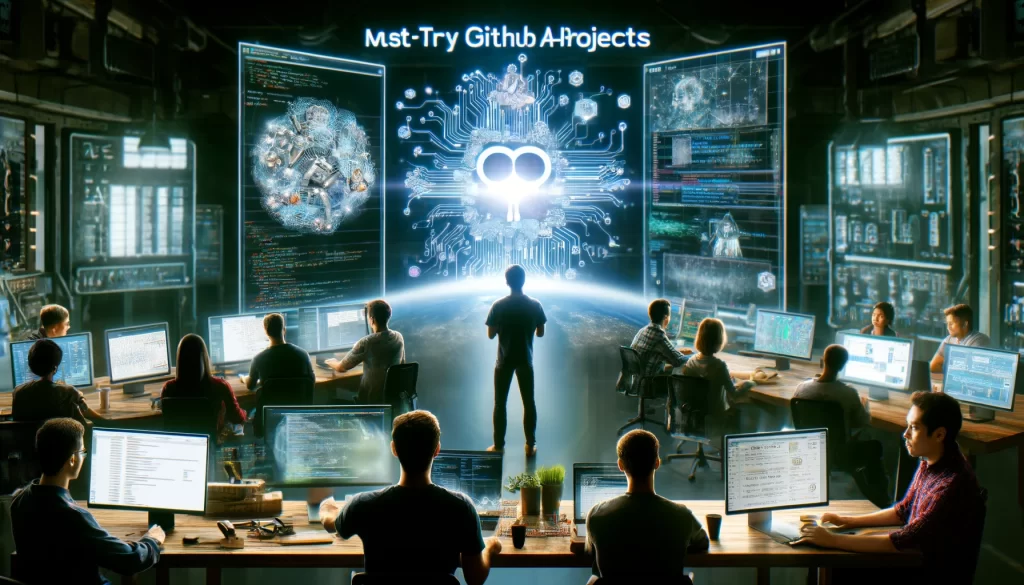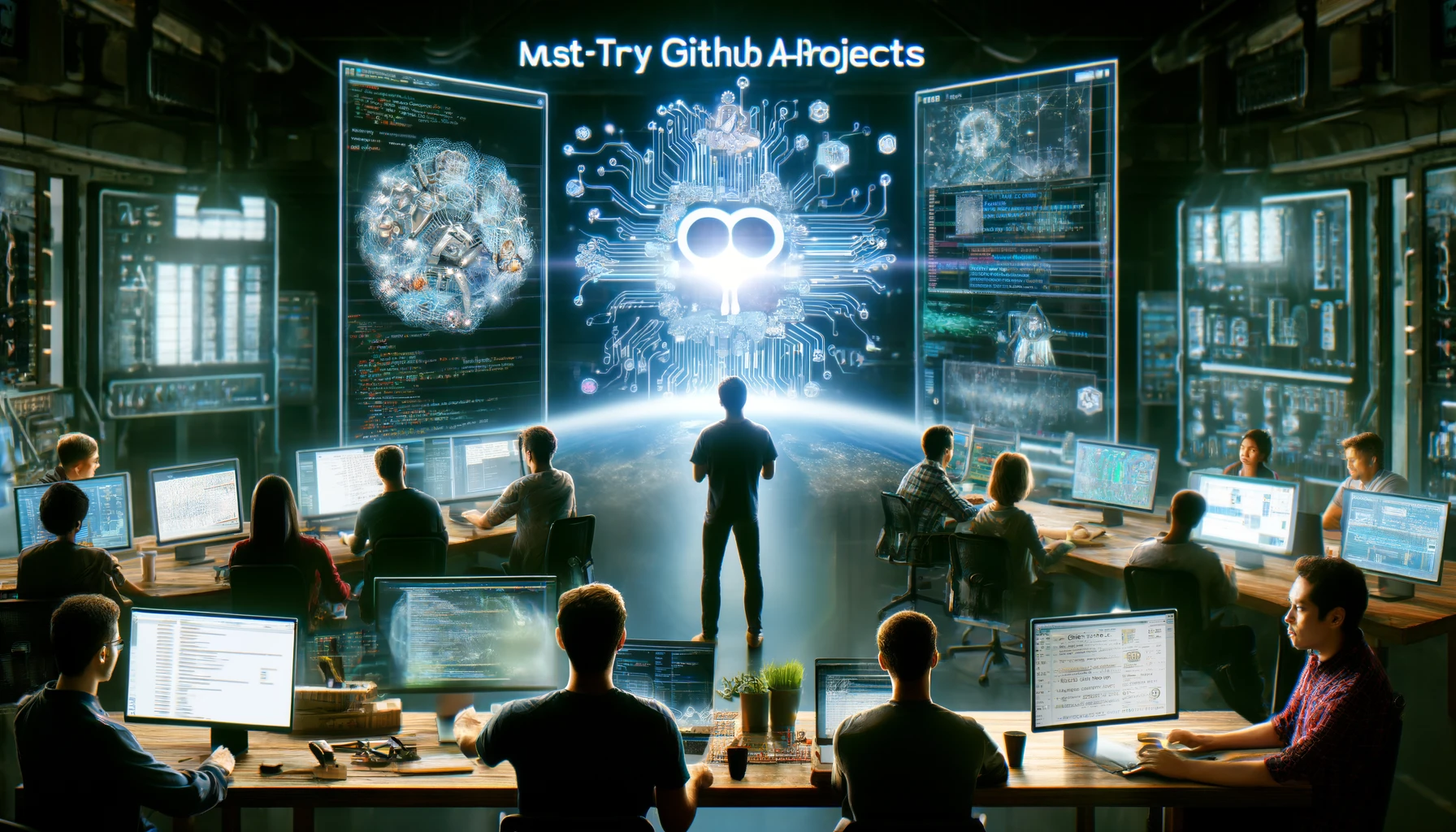The open-source movement has unlocked unparalleled opportunities for developers to explore, learn, and contribute to groundbreaking technologies. GitHub, a global hub for open-source projects, is at the forefront of this revolution. For developers passionate about artificial intelligence (AI), GitHub offers a treasure trove of AI projects that can transform their careers and expand their knowledge. In this guide, we’ll uncover the GitHub AI projects you can’t miss and how you can get involved.
Why GitHub for AI Projects?
GitHub is more than just a code repository; it’s a collaborative ecosystem where developers, researchers, and enthusiasts converge. Here’s why GitHub is essential for open-source AI projects:
- Global Collaboration: Connect with experts and enthusiasts worldwide.
- Rapid Innovation: Projects grow quickly due to community contributions.
- Skill Enhancement: Contributing sharpens your skills and exposes you to diverse problems.
- Portfolio Building: Demonstrate your skills through contributions to high-profile projects.
The Developer’s Guide to Must-Try AI Projects on GitHub
Here are the top GitHub AI projects that every developer should explore.
1. TensorFlow
Repository: tensorflow/tensorflow
Stars: 181k+
Forks: 87k+
Description: TensorFlow is a leading machine learning library developed by the Google Brain team. It supports a range of deep learning, numerical computation, and data flow graph applications.
Why Try It?
- Cutting-Edge Features: Explore tools like TensorFlow Extended (TFX) and TensorFlow Lite.
- Global Community: Engage with a vast network of contributors and researchers.
- Real-World Applications: Work on models used in production at Google.
2. PyTorch
Repository: pytorch/pytorch
Stars: 69k+
Forks: 19k+
Description: PyTorch, developed by Facebook’s AI Research lab, is popular for its dynamic computation graphs and flexibility.
Why Try It?
- Dynamic Graphs: Experiment with dynamic computation graphs for flexible model training.
- Rich Ecosystem: Access advanced tools like TorchScript and ONNX export.
- Active Community: Collaborate with a thriving community of researchers and developers.
3. OpenCV
Repository: opencv/opencv
Stars: 71k+
Forks: 27k+
Description: OpenCV is an open-source computer vision library used for object detection, facial recognition, and augmented reality.
Why Try It?
- Comprehensive Vision Tools: Access tools for image processing and computer vision tasks.
- Multi-Language Support: Work with Python, C++, Java, and more.
- Community Engagement: Participate in hackathons, discussions, and coding challenges.
4. spaCy
Repository: explosion/spaCy
Stars: 27k+
Forks: 4k+
Description: spaCy is an open-source NLP library known for its efficiency and ease of use.
Why Try It?
- Efficient NLP Models: Work on tokenization, named entity recognition, and syntactic parsing.
- Production-Ready: Learn to build and deploy NLP models in production.
- Extensive Integrations: Integrate spaCy with TensorFlow, PyTorch, and other libraries.
5. Hugging Face Transformers
Repository: huggingface/transformers
Stars: 110k+
Forks: 22k+
Description: Hugging Face’s Transformers library has set the standard for natural language processing.
Why Try It?
- Pre-Trained Models: Access pre-trained models like BERT, GPT-3, and T5.
- Detailed Tutorials: Learn from comprehensive tutorials and documentation.
- Inclusive Community: Join a global network of NLP enthusiasts.
6. Keras
Repository: keras-team/keras
Stars: 57k+
Forks: 19k+
Description: Keras is a high-level neural networks API known for its user-friendly and modular design.
Why Try It?
- Easy to Learn: Build deep learning models quickly with consistent APIs.
- Backend Flexibility: Work with different backends like TensorFlow, Theano, and CNTK.
- Vibrant Community: Engage with students, researchers, and industry professionals.
7. LightGBM
Repository: microsoft/LightGBM
Stars: 15k+
Forks: 4.5k+
Description: LightGBM is a gradient boosting framework that focuses on performance and distributed training.
Why Try It?
- Optimized Learning: Experiment with optimizations for GPU training and parallel learning.
- Cross-Platform Support: Access bindings for Python, R, and other languages.
- Industry Adoption: Collaborate on projects impacting industries like finance and healthcare.

8. Fastai
Repository: fastai/fastai
Stars: 25k+
Forks: 6.4k+
Description: Fastai simplifies deep learning training with high-level abstractions.
Why Try It?
- Simplified Training: Access high-level components for quick and easy training.
- Free Courses and Tutorials: Learn with the help of comprehensive resources.
- Active Forums: Participate in forums and study groups.
9. MLflow
Repository: mlflow/mlflow
Stars: 17k+
Forks: 4k+
Description: MLflow is a machine learning platform that covers the entire ML lifecycle.
Why Try It?
- Lifecycle Management: Track experiments, manage models, and ensure reproducibility.
- Flexible Deployment: Deploy to Docker, Kubernetes, and more.
- Comprehensive Tracking: Efficiently track experiments and manage model versions.
10. Detectron2
Repository: facebookresearch/detectron2
Stars: 26k+
Forks: 5.5k+
Description: Detectron2 is Facebook AI Research’s computer vision library.
Why Try It?
- Advanced Object Detection: Experiment with Mask R-CNN, RetinaNet, and DensePose.
- Scalable Implementation: Handle real-world datasets and applications.
- Research Collaboration: Collaborate with researchers in computer vision.
How to Make the Most of GitHub AI Projects
To fully benefit from GitHub AI projects, consider these practical tips:
- Read Documentation: Understand the project’s goals and contributing guidelines.
- Start Small: Begin with minor tasks like fixing typos or improving documentation.
- Join Discussions: Participate in GitHub discussions and forums.
- Review Code: Reviewing code helps you learn the project’s patterns and standards.
- Pair Programming: Collaborate with other developers through pair programming.
- Open Issues: Help tackle open issues or propose new features.
Final Thoughts: Embrace Open-Source AI Collaboration
Open-source AI projects on GitHub provide an invaluable opportunity for developers to learn, contribute, and network. Whether you’re just starting out or looking to deepen your expertise, these must-try AI projects offer something for everyone. Explore, collaborate, and make your mark on the ever-evolving world of artificial intelligence.

